#this is not a criticism of anyone btw
Text
actually how you dress and present yourself really does matter because nico rosberg, who dresses like the CFO of goop, is largely thought of as narcissistic and self-obsessed, despite the fact that his primary form of social media is linkedin and his two main activities are environmental finance bro and girl dad. meanwhile sebastian vettel is out here regularly posting about his career highlights, commissioning fan art of him and senna to use as merch, and flying 6000 miles to do an insect hotel photo op, but because he dresses exclusively in flannel and hasn't touched a hairbrush in six years people think of him as a humble cabin dwelling hermit
#nico is closer to the person that people think seb is than seb actually is#and vice versa#this is not a criticism of anyone btw#i just think it's interesting how fan views of people are so skewed#and often the only identifying part of these views is how they dress
609 notes
·
View notes
Text
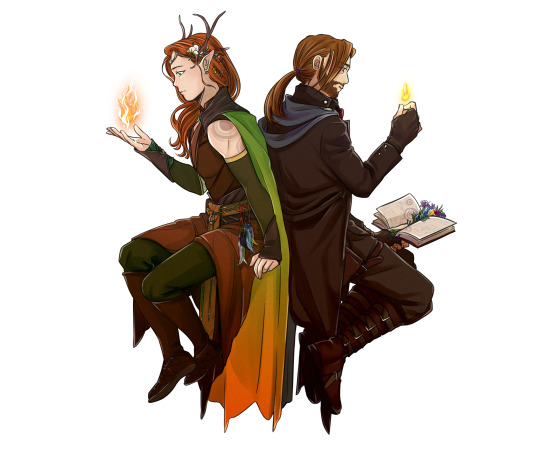
Fire Keepers
---
Since this is the third one I've made for this cross-campaign theme, I guess it's officially a series. Commence the links!
Blue Healers | Wind Walkers
#critical role#critical role fanart#keyleth of the air ashari#caleb widogast#cross campaign series#i have 2 more ideas for the next one in the series but if anyone feels like a x-campaign combo makes sense feel free to shout at me#btw everybody paired up together are leveled up or down to be at the same level#and i try to match the designing style so they might look even more different#but i try to stick to the official sources i.e campaign art comic origins etc as much as possible#anyway keyleth's clothes seem to change colors like the leaves over the seasons the older she gets?#which is so cool <3#art du chat
1K notes
·
View notes
Text
ballister has those huge sad wet puppy eyes but let’s be honest that man is not pathetic. in fact i think he’s really cool and smart and capable.
#this is about movie ballister#nimona#that man made himself a fully functional prosthetic arm in at LEAST one day#bluebird.txt#also he’s smart and strategic#i think he’s really neat okay! he’s very much not pathetic#he found some place to hide and but my guy really did well with coming up with a plan after his entire life got fucked#other than the mistakes (getting arrested going back to the institute and such)#but tbh like. not too shabby mr. boldheart.#i kinda wish they’d made him more scientist-y like he is in the comic but oh well#i think he’s COOL#he’s NOT pathetic#oh this is not a criticism of anyone btw i just think it’s important to note that ballister is neat lol
1K notes
·
View notes
Text
aside from everything else about durgewyll I am loving how it highlights wyll and gortash as narrative foils. both their upbringings lead them to interact with demoniac entities, both can only become archdukes and join baldurian high society through uldred, both are swaying the dark urge from simply following bhaal (and arguably the dark urge sways them from simply pursuing an ideal and the dark urge can recognise both as their equal)
and by playing your card right in act 3 wyll just...gets everything gortash was trying to get? wyll really is a hero saving baldur's gate from the legion of the absolute. wyll influences gortash's favourite assassin into becoming someone they can defeat the netehrbrain together. they can even become archdukes together! ...or they can turn it down and then they can go to he hells to sneak around and have adventures (like gortash and durge used to) and save karlach's life (the same life that is at risk because gortash mindlessly threw it away).
like. it's a lot, wyll and durge can even murder raphael.
#bg3#something something mirrors something something#wyll ravengard#enver gortash#this is not critical of gortash btw love whatever the fuck he has going on#also their upbringing...like yeah gortash obviously was sold to a devil by his parents that is not great#but also wyll indirectly has absorbed from uldred's teachings that his life does not matter as much as the greater good or the right ideals#and that is good but also wrong#i don't have the right words now to elaborate on all of that#throwing this in the void hoping that someone smarter than me gets inspired to elaborate on this#thsi was brought to sceleritas telling durge to never consider anyone else his equal and remembering that gortash always did#bg3 durge#durgewyll#bg3 spoileres#durge spoilers#EDIT: someone pointed out in the tags that gortash doesn't really want to he a hero and yeah but didn't really know how to write it out
416 notes
·
View notes
Note
Guardianship au,,,,,save me guardianship au,,,,,,,
If you don’t mind the questions, how’d the Tortuga gang react to Chris tagging along? I assume they understood Chris would be joining them early on into Martin being accepted, but I imagine the situation was more like. Martin snagging a new job on the Tortuga >> realizing he can’t take this job and leave his brother alone >> Chris says don’t worry just take me with you >> Martin nervously asking heyyyyyyyy is it cool if my little brother comes with?
Obviously everyone had to be cool with it eventually, but do you know what Aviva, Koki, and Jimmy had going through their heads when a mildly emo, 14yo Chris rolled in with a deeply anxiety-ridden Martin?
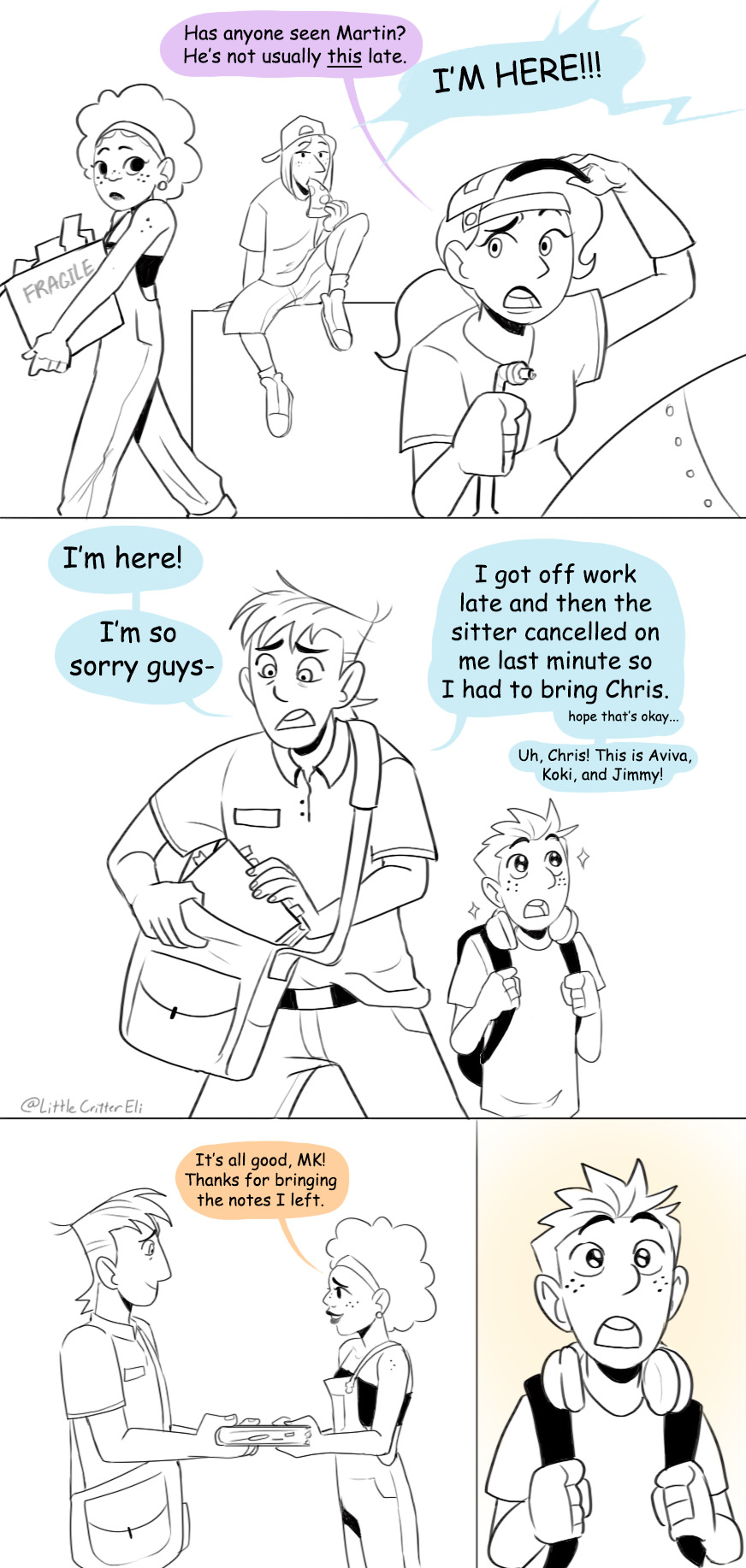
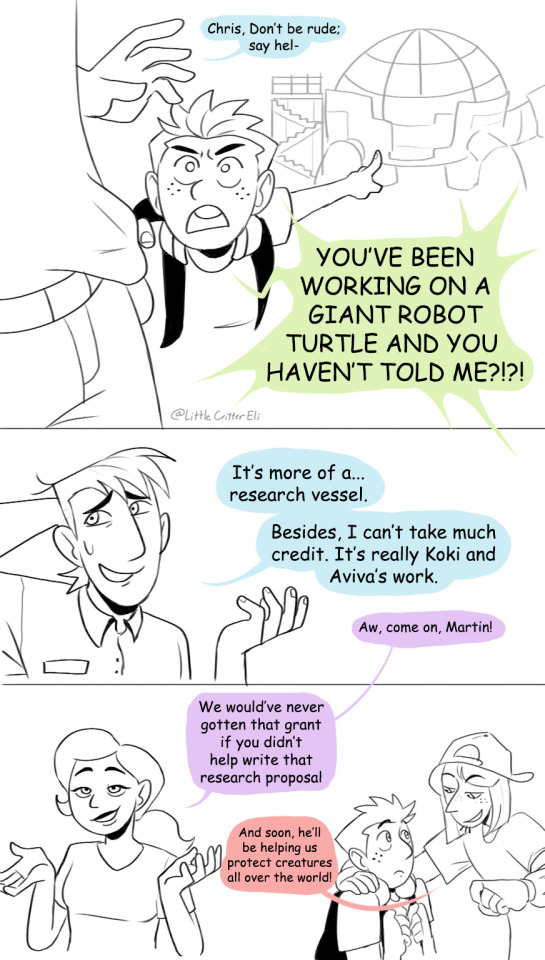
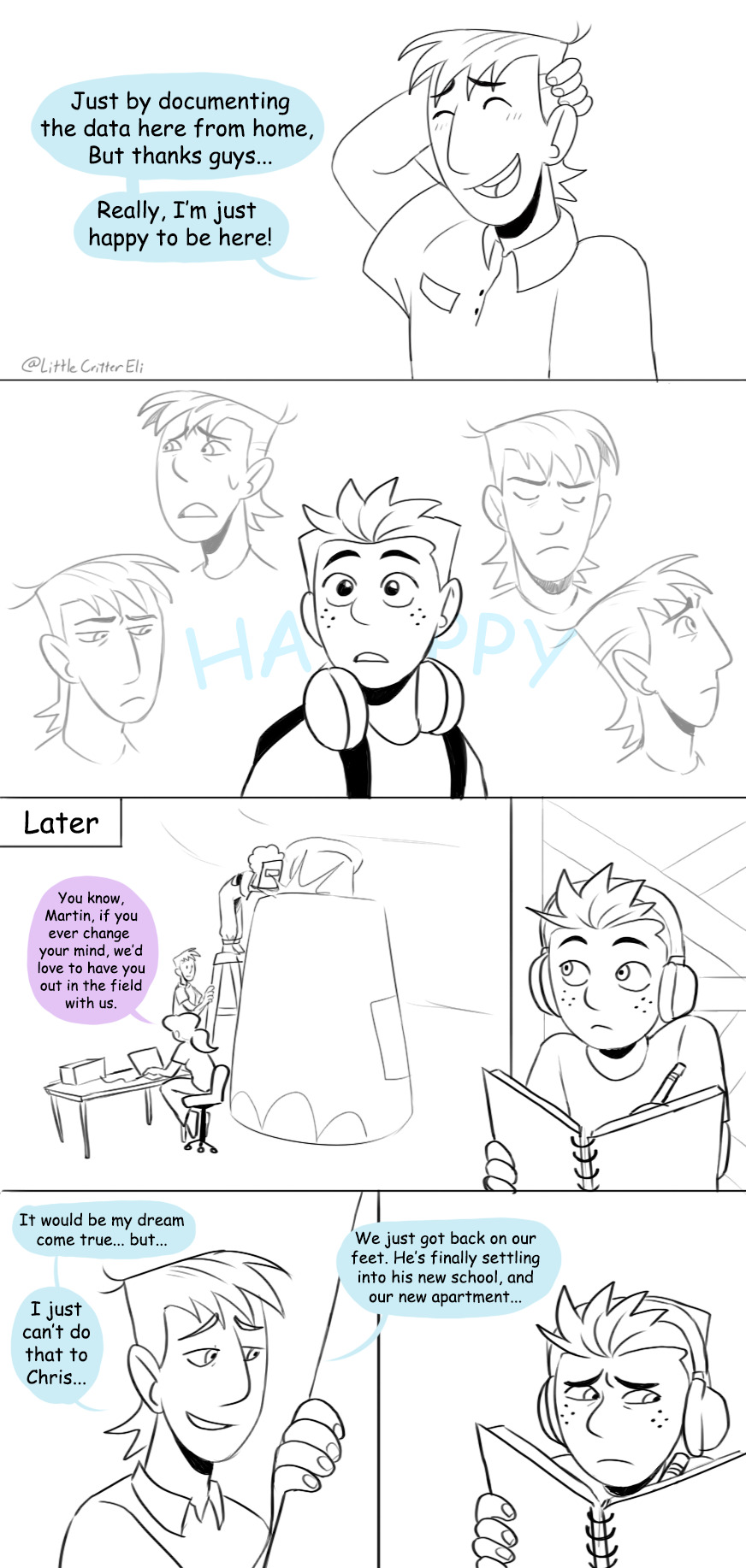
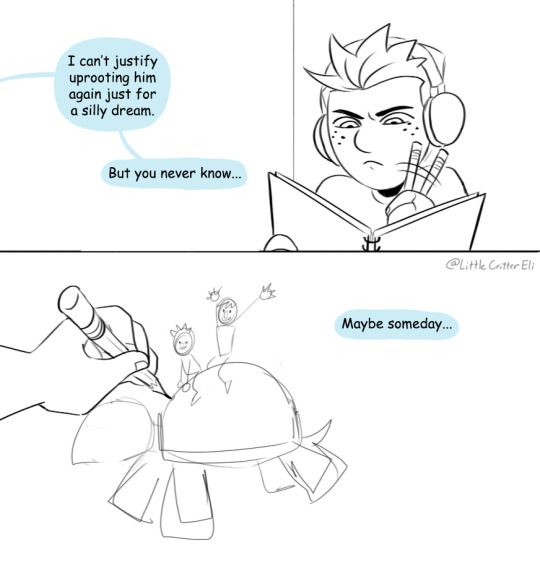
This is kinda the awkward phase of the team's relationship where they know Martin is struggling, but he's not willing to let them help just yet.
The second Chris finds out about the Tortuga it becomes his life-mission to convince Martin to let him go on the trip (it will not be difficult at all to convince him)
Martin is just hesitant because he wants to make sure he's not being selfish in his decision to join the team. Of course Chris wants to go too, but Martin is trying to think of his best interest.
Of course, he eventually realizes that the team genuinely cares about them and he's willing to let them help out with Chris, and then the found-family can commence!!!
#wild kratts#littlecrittereli#WK Guardianship AU#chris kratt#martin kratt#wild kratts au#wild kratts fanart#kratt brothers#asks#aviva corcovado#wild kratts koki#wild kratts jimmy#They actually approach Martin first about Chris tagging along#but Martin is just kinda protective at this point#and doesn't really trust anyone else when it comes to chris#and literally other adult is already criticizing him for not being a “suitable” guardian#So he's trying to be the picture perfect parent and give Chris a normal picture perfect childhood#until he's like fuck it we aren't normal lets go creature adventuring#and it ends up being the best decision he's ever made and Chris comes out of his shell so much#and actually connects with other people besides Martin#and martin actually has friends now OUGHHHHH#THEY ARE EVERYTHING TO ME BTW#didn't mean to lore dump in the tags but yeah
264 notes
·
View notes
Text
My personal biggest pet peeve regarding analyses of Belos (obviously aside from “he’s just evil and analyzing him at all means you support his actions” and “he deserves redemption actually”) is that so many people take his hatred of witches completely at face value--as simply being the result of his indoctrination into witch-hunting as a child in Gravesfield, that these are just the beliefs he was raised with and that he never grew to see past his prejudice like Caleb did. But that is such an oversimplification of his character, and it also ignores what is in my opinion the main driving force behind all of his actions: Caleb himself.
Belos doesn’t think all witches are evil because he was raised to be a witch-hunter. He HAS to keep himself convinced that they are, because if the witches are not evil, then he has two realities to face:
Caleb left him of his own free will, not because he was under a spell or led astray by the devil.
Belos murdered his own brother, the only person he ever loved, for nothing.
And these CANNOT be true.
Belos’s need to be the hero who saves humanity from witches is not the reason he killed his brother, it’s the result of it.
#guess who's witteposting again#toh#the owl house#emperor belos#philip wittebane#caleb wittebane#wittebro#wittebane brothers#toh analysis#belos#caleb#analysis#also my criticism here is based on general themes i see in the fandom at large. i'm not vagueing anyone specific with this post btw#also do NOT use this post as an excuse to demonize caleb or blame him for what belos does. we will be having none of that on my blog#anyways it makes me so sad when people take belos's need to be the hero as him merely being arrogant#and not as the only way he can live with himself after killing caleb#belos analysis#rulersr4mbles
781 notes
·
View notes
Text
hey guys! I just wanted to say that all the attention and support that my silly fancomic is getting is as amazing as it is overwhelming. All the kind words and fanart are so validating and wonderful and I’m so happy that people seem to enjoy my work!
That being said, I do just want to give everyone a gentle reminder that this is just a fancomic, posted for free on Tumblr. I don’t get paid for it (aside from the occasional kofi), I’m not a professional in any way, and nothing about my comic is canon or canon-adjacent or associated with Zag at all. It’s 100% just a labor of love, I’m just some person on the internet with a drawing tablet and too much free time, and I’m really just doing this for fun.
This is all to say, it can be kind of strange stumbling across disappointed analysis posts on my dash (written like I’ll never see them) or getting asks that seem to have certain expectations of me and the comic that I’m making purely as a hobby. I do understand it, and on some level I should have expected it, because this dumb comic of mine really blew up in a way that I never would have predicted. I just know that no matter what, with the amount of eyes on it, it’s going to disappoint some people— probably a lot of people— and people are going to have expectations of me that I’m not going to be able to meet. And that’s okay, there’s nothing I can really do about it, and I’m going to keep working on this story that I initially wrote self-indulgently for my own entertainment, but... yeah.
I guess TLDR: I’m just some tumblr user. I’m on this platform too, and I do see the posts people make about my work. I never meant to make my comic come across as anything more significant than just another piece of fanwork.
#bakery enemies au#i hope this doesnt come across as me implying that im above criticism or anything#i cant stop anyone from doing or saying anything. i guess i'll just try to make a point to not read posts about me that#weren't written with the intention of me reading them#i guess that's something i have to work on too#(also i've gotten some strange asks but that's neither here nor there)#this is all of course a small vocal minority btw!! i dont mean to imply otherwise
4K notes
·
View notes
Note
Ahem. I know what other brushes LO uses ;)
(Forewarning: most of these brushes are from early LO and as such aren't used anymore. I will put an * next to the recent brushes Rachel uses.)
Pastels, Gouache, and other textured brushes (used mainly for backgrounds):
Pastel Palooza (Kyle's Megapack)
Pastella (Kyle's Megapack)
Fat Fun 100 (Kyle's Megapack)
Fat Fun Spongy (Kyle's Megapack)
Hard Square Pastel (Kyle's Winter 2019 set) *
Pigmentia (Kyle's Fall 2021 set) *
Sheriff Coal (Kyle's Spring 2022 set) *
Watercolors (used for backgrounds like clouds and texture)
500 Giant (Kyle's Watercolors)
Medium Wash Texture (Kyle's Watercolors)
Soft Irregular Wash 150 (Kyle's Watercolors)
Soft Wash 120 (Kyle's Watercolors)
FX:
Kyle's Splatter Brushes - Splatter Bot C (Kyle's Splatter set)
Stars 1 and 2 (Kyle's Splatter set)
Pressure rake (Kyle's Rake set) (warning: while this brush can be imported into CSP, this brush only properly works in Photoshop and Procreate because of their specific brush engines that allow 360 brush tip rotation)
Wet Ink Dynamic (Kyle's Splatter set)
Wet Ink Random (Kyle's Splatter set)
Bird Mix (Kyle's Concept brushes)
Bird Mix Vintage (Kyle's Concept brushes)
Break Glass (Kyle's Concept brushes)
Crackup (Kyle's Concept brushes)
Downpour (Kyle's Concept brushes)
Gulls 1 and 2 (Kyle's Concept brushes)
Manga Line Varied (Kyle's Concept brushes)
Manga Lines Broken (Kyle's Concept brushes)
Any of the smoke brushes (Kyle's Concept brushes) (warning: like the pressure rake brush, they work properly in Photoshop or Procreate)
Get the concept brush set. I'm not joking.
The entirety of Kyle's Winter 2022 set (Rachel is using these for how winter looks in the mortal realm) *
Foliage:
Fall Color Save (Kyle's Concept brushes)
Foliage Color Mix (Kyle's Concept brushes)
Foliage Mix 2, 3, and 4 (Kyle's Concept brushes)
Foliage Mix Dry 1 and 2 (Kyle's Concept brushes)
Brancher Big, Medium, and Small (Kyle's Concept brushes)
Foliage Pro 1 - 8 (Kyle's Concept brushes)
Foliage Small Color (Kyle's Concept brushes)
Foliage Ground cover (Kyle's Concept brushes)
Maddy Bellwoar's Ghibli-inspired brush sets* (can be found on Gumroad for the cheapest price)
Hope that helps!

listen here my dear sweet anon
first of all, there is no forewarning needed here that these are mostly from early LO, early LO is what I'm dying to recapture so you already struck gold and you can stop digging (or don't, because holy shit finding this in my inbox was like christmas for puff round 2)
second, i hope you're happy choosing this timeline where you're my new bestie because goddamn this is COMPREHENSIVE
and third (and most importantly) how in the flying FUCK did you know about some of these
like it's clear at this point rachel uses a lot of the kyle webster brushes, i kinda figured that out ages ago and it was just a matter of figuring out which ones she uses which you've done me the solid of putting together for me
but the ghibli background set?? the brushes that are exclusive to the newest episodes ??
either you've just become the champion of being the most hyperfixated on old LO orrrrr you know something we don't and there's a reason you're using the anon tag-

#i will mention btw there are some i couldn't get thru my usual download sources#the winter 2019 fall 2021 and spring 2022 set#thankfully they only contain one brush each all of which are from the newer episodes as labelled#but i'd still like to nab 'em so if anyone has any leads or can share these brushes with me pls lmk in my asks <3#everyone thank our almighty anon for passing on these resources#i've gone ahead and updated the brush pack post which now includes almost all of these as a background brush set#lore olympus critical#lo critical#anti lore olympus#lore olympus redraw
233 notes
·
View notes
Text
Anyways XO Kitty love interests summarized
Dae

Min Ho

Yuri
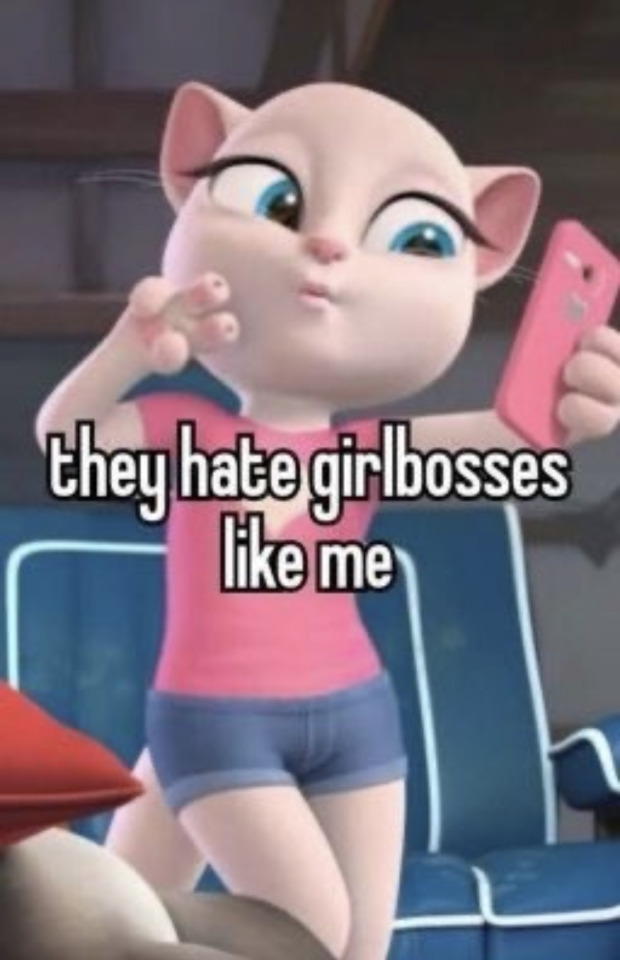
#I finished it guys I have thoughts#pleasantly…. surprised I actually enjoyed it a lot?#like don’t get me wrong it was very cringe fail at times but in like an affectionate way in like an aw high school affectionate#bet y’all can’t tell by this post which my favorite LI was I bet y’all can’t guess take a guess#ranking wise Yuri>Min Ho>Dae#I am so sorry Dae is so aksjskw boringgg and like not even because he is a nice guy I love nice guys#he just didn’t have any personality whatsoever apart from chasing Kitty around and saying I can explain#they could have swelled more into him being a family guy but they just kinda didn’t and it was very meh overall#like min ho was an ass but kinda funny at times and had a whole character arc#yuri had a whole development too going full circle and growing as she faced different situations in the series#dae I feel like he started the same way he finished and I guess that makes sense for the plot showing Kitty needs something else but defo#makes him the weakest li. no criticism taken btw#SHUT ME UP ITS 4 AM AND I AM PSYCHOANALYSING A KIDS SHOW AKSJWKKW therapeutic#xo kitty#I hope this doesn’t offend anyone lol all /lh#dae#min ho#yuri
647 notes
·
View notes
Text
one of the things I really love about this game is that if you empower and support your friends (while! calling out their bs and not enabling) then they just MAKE THE RIGHT DECISION that is most ethical and/or best for them ON THEIR OWN and that is so!! good!!! IT IS SO GOOD!!! AAAAAHHHH
#bg3#baldur's gate 3#I LOVE THIS GAME SO MUCH IT IS ALL ABOUT AGENCY AND EMPOWERMENT AND BREAKING FREE FROM OPPRESSIVE FORCES AND PRESCRIBED VALUES CRIES#anyway#bg3 spoilers#bg3 ending#astarion#shadowheart#karlach#wyll#no need to even persuade anyone or call on ur authority or anything#I habe thoughts on that authority btw#And they are CRITICAL OF IT#like who tf makes u leader??#anway that is for another day
286 notes
·
View notes
Text
yknow i'm a hater but i can't help but think about how many extra scenes astarion got and how that time could have been used to give halsin and minthara more content, or add in the cut jaheira romance stuff, or like. literally anything
#fray.txt#bg3 critical#happy for astarion fans who literally only care about him but also so mad for literally everyone else#ask to tag btw if u want me to tag anything negative i can#also if anyone says anything like 'but they have different writers so it couldnt work like that!' or anything along those lines. i bite
212 notes
·
View notes
Text
What is Essek's Wisdom score?
(aka, a totally unnecessary ramble about one drow and his dnd mechanics by me, a tumblr user who should be asleep)
Last episode, we got a rare hint about Essek’s Wisdom score, in the form of Fearne’s attempt to sneak a look at his feet while he slept. Whatever Essek’s passive perception is, it was ‘just enough’ to catch Fearne, with her Sleight of Hand check of 9. I made a joke about this giving Essek a pretty low Wisdom score, and several people pointed out that because Matt halves his characters’ passive perceptions when they’re sleeping, Essek’s Wisdom would actually be around the 18-20 mark. But this… might not necessarily be the case.
Now, I did honestly mean that post as a joke and not any actual theorising on Essek’s mechanics, but since people got me thinking, let’s crunch some numbers! (Huge thanks to the folks over on the Essek discord for helping me with the maths here! Also, disclaimer that all of this could be disproven next episode, and I am fine with that. I enjoy doing dnd maths anyway, because I am a nerd.)
So: if Matt remembered the house rule about halving the passive perception while a character sleeps (and he doesn’t always), this would give Essek a passive of 18-20. But does this mean his Wisdom is 18-20? Actually, no! For a start, if he had no other bonuses to perception (and I’ll get to that in a second), this would give Essek a bonus of +4 or +5, which would make his awake passive just 14-15, and his sleeping passive 7. Not enough to catch Fearne. But: it might well be the case that Essek simply has Perception proficiency, in which case, he wouldn’t need a Wisdom of 18+.
While Essek, being an NPC, obviously doesn’t conform to PC rules, it’s worth bearing in mind that all elf PCs get perception proficiency for free from their Keen Senses trait. Perception would therefore be a pretty reasonable proficiency for Essek to have, even if it didn’t make sense from a character perspective – which it does. He is, after all, constantly having to look over his shoulder for assassins (and even before he was, having a keen eye out for trouble would be a useful asset in his former courtly intrigues.)
So what does this mean for his passive perception? Well, he appears to be the equivalent of a level 17-20 wizard, if his use of a ninth-level spell slot is anything to go by. With the caveat that he doesn’t have to use player rules (just attach that caveat to, uh… everything I say in this post) that would give him a + 6 proficiency bonus. If this is true, then all Essek needs for a waking passive perception of 18 is actually a Wisdom modifier of just +2, i.e. a Wisdom score of 14 or 15. (A baseline of 10, plus 2 from his Wisdom, plus 6 from proficiency). This would allow his halved passive to be at least 9, and let him catch Fearne in her sneaky feat of feet-peeking. If we make his Wisdom any higher than this, I don’t think we can qualify Matt’s ‘just enough’ statement.
But wait! There are more options! Unlikely ones, but options worth bearing in mind, nonetheless. We know Matt is on board with giving his allied NPCs feats; indeed, Essek himself has the War Caster feat. So it’s entirely possible that he might also have the observant feat. This would be a very logical choice from a roleplaying perspective considering Essek’s current status as a fugitive.
Having this feat would add +5 to his passive perception. Let’s say Essek has no Wisdom bonus at all, but has this feat and is proficient in perception. In this case, his passive while awake is 21 (a baseline of 10, plus 5 from Observant, plus 6 from profiency). That's a sleeping passive of 10: just enough to catch Fearne in the act. We could actually dump his Wisdom into the negative and he'd still be able to just barely notice her.
If you shook me and asked me to tell you what I actually think Essek’s Wisdom is, I’d guess at his Wis being at that ~14 mark I pitched earlier. I think this would make sense from what we’ve seen of him – yes, he has done some completely dumbass things, but he’s shown a level of self-reflection and self-awareness, especially after his redemption arc kicked off, that I think a Wisdom of about this number is justified. I wouldn't be surprised to find it was lower or higher, though; Wisdom is a wibbly stat to define at the best of times and you can make a case for Essek being just about anywhere on the number scale.
A stat of ~14 also works for me from a character construction perspective: we already know he has an Intelligence of around 22, and a decent Charisma; back in campaign 2, the Nein regularly had to roll Insight checks of 20+ to see through him, indicating a high Deception. So I’m hesitant to pitch his Wisdom too high; this might just be my own personal preference as a DM, but I’d be unlikely to roll up an NPC ally with high numbers in all three mental stats. Give ‘em some lower scores to keep things spicy, y’know?
(As a side note, Essek’s Dexterity is a very serviceable 16, and I suspect that his Charisma is at least equal to that. Having scores of 16+ in four stats would be a bit much, imo, even if his Strength and Constitution are probably much, much lower.)
A final point: one thing we can rule out is Matt allowing Essek to use his regular, un-halved Passive while trancing, since he didn’t remember that Essek could trance until Laura reminded him (bless them both), and I’m pretty sure the Fearne incident happened before she did. Though I should say again, considering that Matt can and does forget rules from time to time… it is also true that Matt might’ve just forgotten about halving the passive score. If he did just forgor, this entire ramble is meaningless but oh well.
Tl;dr: we don’t know, but a reasonable guess would be to say that his Wisdom is about 14. I guess I’ll just sit here and hope that Matt may eventually release his statblock (and an explanation of how he made his dad so mad he died. Hi, Matt Mercer, not to beg but please –)
#critical role#cr spoilers#cr3 spoilers#essek thelyss#this was so dumb but I couldn't sleep til I'd got it out of my head#(gentle request for people to stop 'um actually'ing the original post now sdhfd#i know you mean well and ily but it was a joke I cannot stress how much it was a joke)#my cr meta#genuinely interested in anyone's thoughts on his Wisdom from a character perspective btw!
103 notes
·
View notes
Text
assigning you a canon batman character based on your favorite fanon jason todd trope/headcanon
catholic, quotes the bible, connected with mafia, works as a teacher at school, has a close relationship with tim drake — helena bertinelli (huntress)
doesn't kill people, good older brother, has a close relationship with tim/damian/babs/etc, best/most recognizable robin, a good leader, in love with roy harper — dick grayson (nightwing)
catholic, "lazarus pit rage", uses a flaming sword, manipulated by a cult to be an assassin, has a close relationship with cassandra cain — jean paul valley (azrael)
cares about and protects women and children, takes over criminal underworld — selina kyle (catwoman)
lady shiva is his mom — cassandra cain (batgirl)
talia al ghul is his mom — damian wayne (robin)
#idk if somewone made something like that already#feel free to add more#it's just a joke btw#i'm not criticizing or shaming or attacking anyone okie#do whatever you want and like whatever you like!#however not all headcanons are created equally...#batman#batfam#batfamily#jason todd#red hood#dick grayson#nightwing#tim drake#robin#red robin#jean paul valley#damian wayne#fanon vs canon#ah yes jason todd... the everything character!#jason todd headcanons#jason todd headcanon#batboys#anti batfanon
113 notes
·
View notes
Text


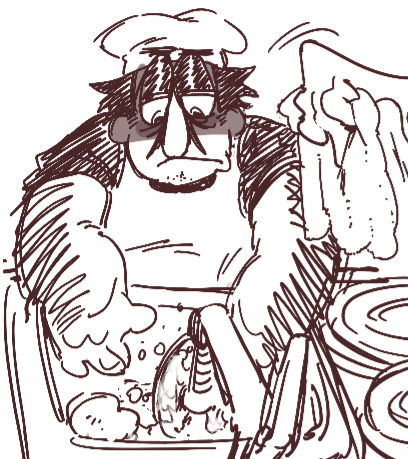

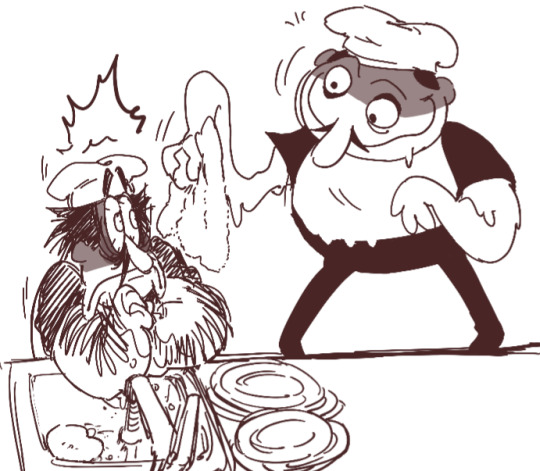
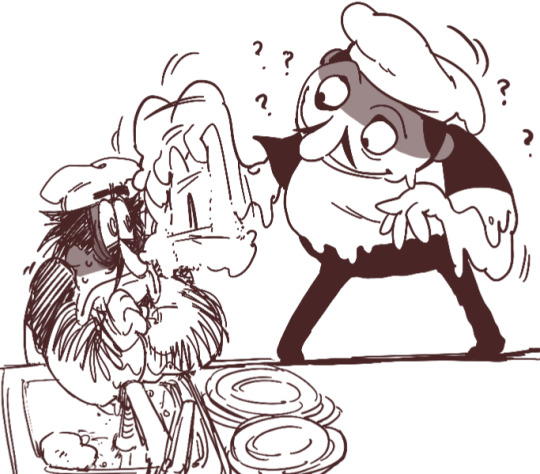


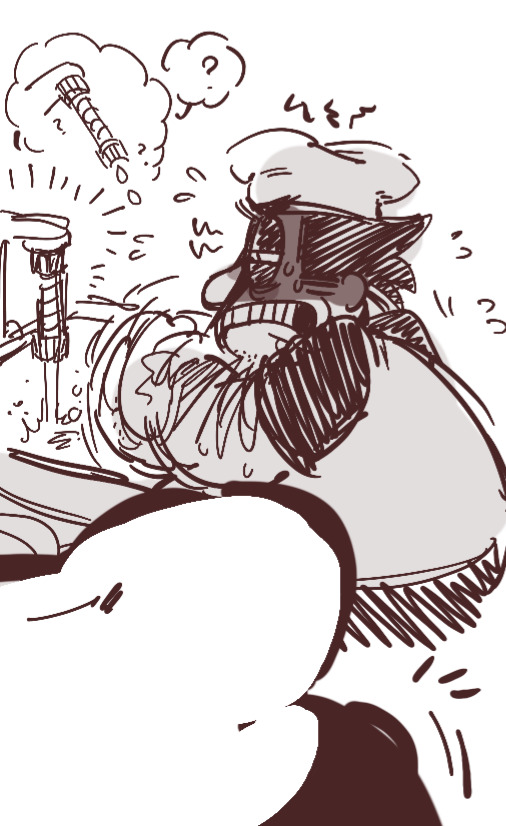
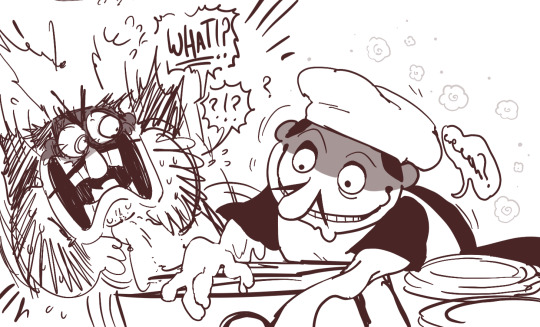
(1/2)
(Second part)
#mainly putting these here for storage/to place them <:3#btw i am aware of the dev and their not good behavior#i dont support them or anyone else who is still shitty!!#but i enjoy the characters and the other aspects of the game that arent shitty#and of course will remain critical about it.
788 notes
·
View notes
Text
"Minkowski's been talking about Sondheim again…": Minkowski's love of musical theatre and what it reveals about her characterisation and her relationships
TL;DR: Renée Minkowski's love of musicals, while it might seem just like a mundane character detail, is used to give depth to her character because it contrasts with expectations of her from both the listening audience and the other characters. Her willingness or unwillingness to share this interest in different circumstances reveals her relationships with other characters at various points.
Since this is a long one, if you'd rather read it as a document, you can view it here: Google Doc version.
"She actually really cares about these talent shows": Episode 8 (Box 953)
In the early episodes of Season 1, Minkowski is presented (largely through Eiffel's unreliable perspective) purely as a strict no-nonsense authority figure without much emotional depth, the kind of person who only likes things that are useful, purposeful, or mandated by Command. In contrast, musical theatre is a creative pursuit that has nothing to do with the mission of the Hephaestus and is viewed by many people as fairly frivolous or silly. The gradual exploration of Minkowski's passion for musicals is one of the many ways that the show expands and challenges our understanding of her as a character.
The first indication that we get of her interest in musicals is through her entry into the infamous talent show, something that is required as part of the mission. Minkowski really cares about 'crew morale' activities in general, even when they actually have a negative effect on morale and even before she's friends with any of her crew (for example, the Christmas and Thanksgiving dinners in the earlier stage of the mission), perhaps partly because doing things in the "right way" is important to her.
But Eiffel senses that the talent shows aren't just about rules for her: "it’s bad enough when she makes us do something just because it’s military protocol, but I think that she actually really cares about these talent shows". This might be the first indication that we get of Minkowski caring deeply about anything that isn't inherently part of her role as a Commander. Moments like this are part of the gradual process of giving us insight into her character beyond the Commander archetype that she tries to embody. And yet, she only indulges her theatrical passion because something mandatory gives her permission, or an excuse, to let another part of herself out.
Of course, to satisfy the needs of a talent show, she'd only need to provide a performance of a few minutes. But Eiffel mentions "the second act of the play" - which along with Hera's comment that "Isabel isn't the biggest role in the play" - implies that Minkowski was intending to put on the whole of Pirates of Penzance as her talent show act, rather than a few of the songs or some kind of medley. (I suppose that Eiffel could be exaggerating or Minkowski might have been planning to do extracts from different parts of the play, but I prefer the interpretation in which Minkowski gets to be more ridiculous.)
Even though no one else would be willing to be in her production of Pirates of Penzance, Minkowski casts Hera as Isabel, a role with two lines and no solo singing. I found some audition notes for this play which said "The traditional staging gives [Isabel] more prominence than the solo opportunities of the part suggest, so she must be a good actress" which does make me sad in relation to Hera's inability to have a more significant role by being physically present on stage.
It’s sweet that Hera still wants to take part though. She tells Eiffel "Pirates of Penzance is a classic of 19th century comic opera", so either she’s absorbed what Minkowski has told her about the show, or she’s done her own research and formed her own opinions. I enjoy the fact that Hera is the one Hephaestus crew member who shows potential to share Minkowski's musical theatre appreciation; I like to think that this is something they could explore together post-canon.
Anyway, I'm obsessed with the idea that Minkowski was planning to play every character except one in Pirates of Penzance, a show which is designed to have 10 principal characters and a chorus of 14 men. It seems that her contribution to the talent show was supposed to be an entire two-hour two-act musical, with costumes and props, in which she would play almost all of the parts. This is very funny to me as the perhaps predictable consequence of giving an ambitious and frustrated grown-up theatre kid a position of authority and asking them to arrange a talent show. Minkowski knows that the audience will be made up of her subordinates who are theoretically obliged by the chain of command to watch and listen, so she absolutely tries to make the most of that opportunity. There's probably also a degree to which she limits other people's involvement in her musical because - as with her other endeavors - she wants the outcome to be almost entirely within her control (something that is usually pretty much impossible in as collaborative a medium as musical theatre).
Of course, Minkowski's behaviour in most of the talent show episode is affected by her being drugged by Hilbert. This creates an exaggerated situation which is the first real opportunity for Minkowski to be something other than the strict sensible authoritarian Commander and the foil to Eiffel's jokey laid-back attitude. I don't agree with ideas that being intoxicated brings out anyone's true self (especially in the absence of consent for the intoxication), but it seems pretty clear that being under the influence of whatever was in Hilbert's concoction caused Minkowski to fully commit to a level of manic enthusiasm for her musical production that might have otherwise been obscured by her professionalism. It's a particular kind of person who belts showtunes when drunk, and Minkowski is that kind of person, even if that's not how she wants to present herself. (As a sidenote, I seem to remember that they took Emma Sherr-Ziarko's script off her to help her sound more drunk. It's an excellent performance.)
Minkowski wants interval ice cream. She wants "pirate costumes" (and she'll threaten to shoot a man to get them). She wants "swashes and buckles". She wants whatever props she can get her hands on (including a real cannon). This show is important to her, even though only three other people will witness it and two of them actively don't want to be there. It’s important to her for its own sake.
Eiffel says Minkowski wants "a second pair of eyes to tell her if the prop sabre for her Major-General costume was a bit much…" While I certainly wouldn't put it past Goddard Futuristics to have a prop sabre on the station for no apparent reason, it feels more likely that she might have made it or adapted some existing item. Which suggests that maybe she was that passionate about the props even before Hilbert drugged her.
Even so, it does feel significant that Minkowski's love of musicals is only revealed in the episode in which she is drugged, exhibiting lowered inhibitions, exaggerated behaviour, and an "impaired euphoric effect". Her love of musical theatre is initially revealed through a professional structure that provides permission, and then further emphasised by a forced intoxication that exaggerates some impulses that perhaps she already had.
"Some hobbies other than making trains run on time": Episode 17 (Bach to the Future)
After Eiffel tells to find Minkowski to find something else to do while her work duties have quietened down, they have the following exchange:
EIFFEL: You must have some hobbies other than making trains run on time. Something to do with friends? Boyfriends?
MINKOWSKI: Of course I do, but, well, there aren't really a lot of opportunities for rock climbing or trail hiking in the immediate vicinity.
Even though this quote doesn't mention musicals, I've included it here for two reasons. Firstly, it's very funny to me that, even after the talent show debacle, Eiffel acts like he's never had any evidence of Minkowski's hobbies. She tried to perform a whole play almost single-handedly and it didn't occur to him that this might indicate an interest of hers outside of work. I think this reflects the fairly two-dimensional view that Eiffel has previously had of Minkowski, which her interest in musical theatre didn't fit into.
Secondly, it feels notable that Minkowski doesn't mention musical theatre here. She wants to show that she has non-work interests, but without undermining her own authoritative image. Her interest in rock climbing and trail hiking - while it may be genuine - fits with how she wants to be seen as a Commander. These are hobbies which portray her as physically capable, with a high degree of stamina and a willingness to adapt to perhaps less hospitable surroundings. Of course, Minkowski does have these traits and they serve her well on the Hephaestus. But there's not really anything particularly surprising about her expressing these interests. The surprise in this scene comes from the reveal that she has a husband, a character detail which - like her love of musicals - isn't something we'd necessarily expect from the archetype-based view of her we are initially presented with.
Her interest in rock climbing and trail hiking never come up again, because these details don't really deepen her characterisation (or at least, they aren't really used to deepen her characterisation beyond proving that she isn't entirely all-work-and-no-play). In contrast, Minkowski's love of musicals is brought up over and over because it shows another side of her that she struggles to reveal on the Hephaestus, and that allows more interesting things to be done with her characterisation.
"You wanted to write showtunes": Episode 35 (Need to Know)
Alongside the more high stakes discoveries prompted by the leak from Kepler's files, we also learn that Minkowski applied to - and was rejected from - the Tisch Graduate Musical Theater Writing Program.
Up until this point, we've only had evidence that Minkowski enjoys performing in musicals. But here we learn that Minkowski doesn't just love watching or performing in musicals - she wanted to write them too. This suggests a creative side to her that we never see her fully express.
The course
The Tisch Graduate Musical Theatre Writing Program claims to be the only course of its kind in the world and it accepts just 30 students each year. The current application process requires applicants to: upload play scripts or recordings of songs they've written; answer a large number of extended response questions about their creative process and views on musical theatre; write a 'statement of purpose' which has to talk about why they are applying and include 3 original ideas for musicals; provide a professional resume and a digital portfolio; complete an exercise of writing in response to a prompt; and undergo an interview. The process might have changed somewhat since Minkowski would have been applying (which, if it was soon after she finished college, might have been around the early 2000s) or it might be different in Wolf 359's alternate universe, but I think we can safely assume that applying to this course was a serious undertaking that required an intense amount of commitment and work.
Applying to a course like that isn't something you do half-heartedly or on a whim. You couldn't apply to this course if you hadn't done a fair amount of musical theatre writing already. (The course requires applicants to choose to apply as bookwriters, lyricists, or composers, but I'm not going to make a guess here as to which of these Minkowski went for.) The fact that Minkowski wanted to study this course suggests that she was seriously considering trying to make a career out of musical theatre writing. In Once In A Lifetime, she tells Cutter that commanding a space station has always been her dream job, but we've got evidence here that it wasn't her only dream job. There's something kind of funny and kind of sad about the idea that writing musicals was her back-up / fall-back career path. She does not like to make life easy for herself.
The revelation
This information is revealed against Minkowski's will. It's not something she wanted people to find out, and she isn't happy about them knowing:
JACOBI: "Dear Renée, thank you for your interest in the Tisch Graduate Musical Theater Writing Program..."
MINKOWSKI: Oh, come on!
JACOBI: (pressing on) "We are sorry to say, we will not be able to offer you a spot in this year's blah blah blah." Oh this is too good. You wanted to write showtunes?
MINKOWSKI: Number one? Shut up. Number two, why are my personal records on there?! [...] How is it in any way relevant?!
JACOBI: Oh, I think it's very relevant. I mean, if you're sending someone to pilot ships in deep space, you want to make sure that they can, you know... paint with all the colors of the wind.
Jacobi CRACKS UP - and, although to a lesser degree, so does Lovelace. Minkowski looks at her: really?
LOVELACE: Sorry, Minkowski. It's... it's a little funny.
MINKOWKSI: No, it isn't!
Minkowski seems defensive and embarrassed here. She obviously doesn't trust everyone there with this revelation (Jacobi, Maxwell, Lovelace, and Hera are all present). She considers this information to be "personal" and irrelevant and not even "a little funny". She's used to reactions like Jacobi's (and to a lesser extent Lovelace's); in Ep41 Memoria, she says "most people think it's hilarious that I like musicals" (see below for more thoughts about this quote). But the fact that these mocking reactions are expected doesn't mean that they don't bother her. She wants so badly to be taken seriously and, in this scene, her interest in musical theatre seems to be incompatible with that. Jacobi reacts the way that he does because of the idea that I've already expressed, that a passion for musical theatre does not fit with the serious authoritative image that Minkowski has often presented. It's not the typical hobby of a soldier, especially not a Commander.
To me, the way Lovelace laughs suggests that she might not have previously known about Minkowski's love of musicals, or at least perhaps not the full extent of it. At any rate, it's definitely news to Jacobi. And Minkowski clearly hasn't talked about it enough for it not to feel like a big reveal for her.
The rejection
It's notable that this reveal is not just that she wanted to write for the stage, but also that she failed to get into a course that might have helped her work towards that goal. This of course compounds Minkowski's discomfort at having this information revealed. Not only did she want to write showtunes, but she encountered rejection in her attempts to do so. This detail implies that perhaps it wasn't just the appeal of her spacefaring dream that stopped her going down a theatrical career path.
I'm about to move more into headcanon territory rather than just straightforward analysis, but I personally believe that, while Minkowski auditioned for a lot of musicals (particularly as a child / young person), she was never cast as the main role. She seems embarrassed about her interest in musical theatre in a way that (at least judging by people I've encountered) people who were always the lead in their school / college productions don't tend to be.
We don't have much evidence about her actual level of singing/acting ability, given that she is inebriated during the only time we hear her sing in the podcast. However, it resonates with other aspects of her characterisation to imagine that Minkowski was generally good enough to get an ensemble part but never quite good enough to be cast as a main part. I think she might see only ever being cast as part of the ensemble, and failing to get into the Tisch Musical Theatre Writing programme, as slightly more down-to-earth examples of the same pattern as her repeated rejections from NASA. She is desperate to prove herself. She is "someone who very much wants to matter. To do something important." When she casts herself as almost every part in Pirates of Penzance, she is finally taking the opportunity to be a main character, an opportunity which I imagine had been denied to her over and over in both a literal and metaphorical sense.
"It's just from a play I saw once": Episode 41 (Memoria)
The next scene I want to talk about is from a memory of Hera's, which took place on Day 57 of the Hephaestus mission and in which Minkowski appears to be talking about the Stephen Sondheim musical Sunday in the Park with George:
MINKOWSKI: Oh, it's just from a play I saw once. It doesn't matter. (BEAT) The guy who sings it is this famous French painter. And his entire life is kinda falling apart. But he can always turn what's happening around him into these beautiful paintings.
HERA: And?
MINKOWSKI: And... That's, I don't know. Reassuring, maybe? (BEAT) I don't know why I'm going on about this. You don't care.
HERA: I think it's interesting.
MINKOWSKI: Yeah? Most people think it's hilarious that I like musicals.
HERA: I don't see what's funny about it.
MINKOWSKI: Well, thank you Hera, but you're not exactly... you know.
HERA: I'm not... what?
There's a couple of different things I want to pick out from this exchange. Firstly, the line "Most people think it's hilarious that I like musicals" makes me sad. I don't think she's talking about people on the Hephaestus there. Judging by the quote I talked about from Bach to the Future, Eiffel definitely wouldn't have registered Minkowski's love of musicals at this stage, and I doubt Hilbert cares at all about the hobbies of his fellow crew members. So Minkowski is talking about experiences that she's had on Earth, of people mocking her interest in musicals and thinking it doesn't fit with who she is. You can hear the impact of those experiences in Minkowski's reluctance to elaborate, in the way she says that something she obviously cares about doesn't matter, in her assumption that Hera doesn't care.
Secondly, this scene is a complicated one for Minkowski and Hera's relationship. On the one hand, Minkowski freely talks to Hera about something she's passionate about, and Hera listens and expresses interest. Hera validates Minkowski's interest in musical theatre without making a thing of it being weird and Minkowski thanks her. Again, it’s shown as an interest they could could potentially share.
But on the other hand, it seems like part of the reason Minkowski feels able to open up to Hera is because at this point Minkowski doesn't see opening up to Hera as fully equivalent to opening up to a fellow human. She doesn't just accept Hera not making fun of her interest; instead it seems Minkowski is about to imply that this lack of judgment indicates Hera's difference from humans (although she does have the decency not to say it outright). Minkowski's expectation of judgment from others contributes to her saying something very hurtful to Hera here. (This kind of potential consequence of negative self-attitude is explored a lot with Eiffel, so it's interesting that Minkowski can sometimes have a similar issue.)
Minkowski and Hera's conversation is interrupted when:
The DOOR OPENS.
EIFFEL: Hey, Minkowski, we've - What are you guys talking about?
MINKOWSKI: We were just discussing how I'm going to take away your hot water privileges if you don't reset the long-range scan.
Eiffel can obviously tell that he's walked in on a conversation that is about something other than work, or he wouldn't have asked. But Minkowski actively chooses not to tell him that she was talking to Hera about musicals. Perhaps she doesn't know how to open up to a human subordinate about it. Perhaps she doesn't trust him not to make fun of her. Perhaps she just doesn't have any impulse to talk about her interests with him. Either way, if Minkowski's love of musicals is something which reflects a side of her personality outside of her Commander role, this is a moment where she chooses not to take an opportunity to share that side of herself with Eiffel. This reflects the emotional distance between them three months into the mission, which forms a nice contrast with the next couple of quotes I'm going to talk about.
"Composition. Balance. Harmony.": Episode 54 (The Watchtower)
When Eiffel comes directly face to face with alien life, he discovers that music is the human invention that fascinates the Dear Listeners:
EIFFEL: You haven't figured out music?
BOB: ORDER. DESIGN. TENSION. COMPOSITION. BALANCE. HARMONY.
EIFFEL: (low, to himself) Minkowski's been talking about Sondheim again…
I only learned in the course of writing this post that in this moment the Dear Listeners are almost exactly quoting a repeated phrase used throughout Sunday in the Park with George. The titular protagonist lists various combinations of these qualities in multiple songs in reference to his art. In the closing song, the lyrics are "Order. Design. Tension. Composition. Balance. Light. [...] Harmony." It's not only Eiffel's references that the Dear Listeners are incorporating into their speech - they've picked this one up from Minkowski. This also suggests that some element of her appreciation for musicals and the way she talks about them has fed into the Dear Listeners' understanding of the human phenomenon of music. The Dear Listeners aren't just parroting - they understood the quote enough that they left out the word "light", arguably the only quality in that phrase which isn't a big part of music as well as visual art. Eiffel likes music too, but I don't think that this is how he'd talk about his favourite songs.
This is a refrain about finding order and beauty out of the chaos and uncertainty of life, which was also the aspect of Sunday in the Park with George that Minkowski focused on when talking about it in Memoria. It suggests that art/music could be something governed by rules and principles, which is potentially something that appeals both to Minkowski and to the Dear Listeners.
Eiffel's response to this reference is one of those little hints that reminds us that Eiffel and Minkowski have spent a lot of time together and that not all of that time has involved them being at each others' throats or actively in a life-or-death situation. Some of it has just been Minkowski going on about a musical she loves and Eiffel (willingly or not) paying enough attention that he recognises this phrase as a Sondheim quote that Minkowski has talked about. I suppose that this quote might have been in Eiffel's pop-culture-brain anyway, but judging from Eiffel's general tastes and the fact that I don't think Sunday in the Park with George is one of the more commonly known Sondheim musicals among non-musical fans, it seems more likely that this quote is something he only knows because Minkowski has talked about it.
Eiffel sounds exasperated at the mention, like he's heard Minkowski talk about Sondheim far too much. But I'd argue that this still says something positive about their relationship, when we contrast it with a couple of other moments I've already mentioned. Firstly, when her previous musical theatre ambitions are revealed to Jacobi, Maxwell, and Lovelace in Need to Know, Minkowski seems embarrassed and defensive. Secondly, in the memory from Memoria, she avoids telling Eiffel that she was talking about this same musical. Yet, by the time The Watchtower takes place, Eiffel is sick of hearing Minkowski talk about Sondheim. She doesn't have the same barriers up in sharing her interests with him, even though he doesn't have the same interests. I think this is a demonstration of how comfortable she feels with him. It's a hint at the kind of easy downtime that they've sometimes shared.
"One day more": Episode 61 (Brave New World)
Eiffel recognises another musical reference of Minkowski’s in the finale. As the crew are preparing for their final confrontation with Cutter and co., Minkowski quotes Les Misérables, mostly to herself - but Eiffel recognises the lyrics and joins in:
EIFFEL: Hey - chin up, soldier. We're almost through. Just one more day, and then we're done.
MINKOWSKI: Yeah, one more day. (more to herself) The time is now, the place is here - one day more.
EIFFEL: - one day more.
They both stop, dead in their tracks.
MINKOWSKI: Did you just - ?
EIFFEL: Was that what I - ?
They look at each other: No way. And BURST INTO LAUGHTER.
EIFFEL: Man... this is really it, huh? The end of everything.
It feels really important that Minkowski and Eiffel share this moment of togetherness before she tries to send him back to Earth and before the rest of the action goes down. I think there’s some nice symbolism about them finding a way to communicate that they both understand. Making references is Eiffel's thing, and musicals are Minkowski's thing, so this is a synthesis of their two approaches. Again, there's a contrast with Minkowski's previous unwillingness to share her musical theatre passions with Eiffel (at least without the mitigating circumstances of a mandatory talent show and some kind of intoxicating substance).
I talked about the significance of the fact that they reference this particular musical in this post from ages ago. I don't think it's too much of a spoiler for Les Misérables to say that the revolution that the song One Day More is building up to does not end well for the revolutionaries. When Eiffel says "Just one more day, and then we're done", it encompasses both the possibility that the crew will escape to travel back to Earth and the possibility that they will all die. Minkowski's reference to a famously tragic musical suggests that it's the latter possibility that's at the forefront of her mind (right before she tries to send Eiffel away from the danger). But Les Misérables is also a story about people standing together in solidarity against powerful oppressive forces, which gives particular resonance to the way that this reference brings Eiffel and Minkowski together in a moment of being completely on the same wavelength as they prepare to fight Cutter and Pryce's plan.
When they laugh here, it's not about the 'hilariousness' of Minkowski's interest in musicals, it's about their unexpected unison - Eiffel's recognition of Minkowski's reference and Minkowski's surprise at the fact he joined in. It's a laugh of togetherness, of shared understanding, of friendship. It's a moment of lightness in dark times. And that moment is provided by Minkowski's pop culture interests, not Eiffel's. In spite of all they've been through, she's not lost that part of herself, and in fact, she's more open about it, at least to Eiffel.
I'll finish by highlighting what Eiffel says when he's trying to get into character to impersonate Minkowski so he can turn the Sol around:
EIFFEL: Umm... yes, this is Lieutenant Commander Renée Minkowski. I'm... uh... well I sure love schedules, and, uh, musicals. And that man, who I married…
I just think this is a nice example of Eiffel not defining Minkowski solely by her professional Commander role. Sure, she likes schedules (probably in a personal as well a professional capacity to be fair), but she also loves musicals, and her husband. It is a fairly reductive overview of her as a person, but it feels reductive in a fond way, like these things are part of Minkowski's brand to Eiffel in a way that he might affectionately tease her about. (Credit to @commsroom for this thought.) His view of Minkowski has come a long way from "our resident Statsi agent" or even just "you must have some hobbies other than making trains run on time." He doesn't see any contradiction or inherent humour in Lieutenant Commander Renée Minkowski's appreciation of musicals.
Conclusion
Minkowski's love of musical theatre is used to deepen her characterisation and is one of the ways in which we gradually begin to see her complexity beyond the strict Commander archetype. The degree to which she is prepared to share this interest at various points is used to illustrate the nature of her relationships with other characters: a general unwillingness to show a less serious side of herself; a complicated potential shared interest with Hera; and the growing understanding between her and Eiffel.
If you read this whole thing, well done / thank you 😄 It wasn't meant to be this long - it just happened… Feel free to share your thoughts!
#It's Minkowski Essay Time again!#This is over 4700 words and still doesn't cover it all...#I hadn't quite realised there was so much to say!#Wolf 359#w359#If anyone is more familiar with 'Sunday in the Park with George' and has thoughts on why it might particularly appeal to Minkowski#I'd be interested to hear#I listened to the soundtrack and read the Wikipedia plot summary#but I don't think I really got it#My other significant bit of research was that#in order to see what applying to the Tisch Graduate Musical Theatre Writing Program involves#I had to create an account as if I was actually applying#which might be the oddest thing I've done for character analysis#If it interests anyone I could do a post with more detail about that application process#cos it looks insanely intense#Renée Minkowski#Renee Minkowski#the empty man posteth#I hope no one takes things I have said here as critical of musical theatre people btw#I'm just talking about general perceptions#In general I do enjoy musicals myself from an audience perspective
202 notes
·
View notes
Text
the thing is, like, imogen is blunt, and indecisive, and impulsive. she's cynical, angry at the world, and seemingly much less interested in doing good than in holding on to her loved ones. she's hypocritical, incredibly violent one moment and horrified at the prospect the next. she's passive aggressive, on occasion. she's overly critical. she's scatterbrained.
and all of that stuff is very fucking fascinating, and so fun to watch, and core to what makes her her. but not only are those things not the totality of imogen as a character, they're very much inextricable from the things that make her sympathetic.
imogen has spent much of the last decade of her life in pain, and isolated because of it. when she wasn't alone she couldn't relax, having to keep tight control over her mind so as to not get overwhelmed or invade the privacy of others. because even through all that pain and loneliness, she still bore the responsibility not to impose on other people's minds. and when she fails or slips up or gives in, all of the distrust and suspicion she recieves regardless is suddenly viewed as justified.
which is not to say imogen is not responsible for her actions, or the harm she causes others. of course she is! no one is saying she isn't! but, just like literally every other person, her actions don't exist in a void but within the context of both her past and present.
analyzing that context and coming up with explanations of her behavior that consider it is not excusing her actions or refusing to acknowledge her flaws. it is not coddling imogen to sympathize with her even when she's fucking up. these are pretty standard ways to discuss a character you enjoy actually! it's weird that having a nuanced perspective on a character's actions is being treated as an issue!
#imogen temult#critical role#cr#i mean. to get into it a little bit. one benefit of this approach to character analysis is that it often gives you takes that feel#much truer to the text than “imogen speaks into people's heads to manipulate them and she was the one who abandoned her dad” which. how#to get into it even more its so fun that the “not being hypercritical of imogen is sexist actually” discourse is happening mere days after#the “anyone questioning orym's decisions clearly hates him and liam and also conflict and flawed characters in general” discouse. lol#if laura had given a monologue announcing “imogen has seen the cycle of harm and is choosing to perpetuate it” i wld talk abt that too. btw#were i without a massive headache i would devote more attention to anticipating and responding to counterarguments#but we're just gonna have to take the “if you get it you get it” route on this and release this post like a wild animal into a crowded room#ok bye. actually i have an imodna specific followup but then bye.#long post /#CRposting
163 notes
·
View notes